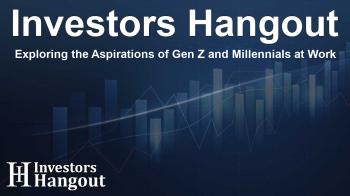Exploring the Aspirations of Gen Z and Millennials at Work

Understanding the Career Aspirations of Younger Generations
The evolving landscape of work is significantly shaped by the perspectives of Generation Z (Gen Z) and millennials. Recent insights reveal that these younger generations prioritize their financial well-being, career growth, and a desire for meaningful experiences over traditional measures of success.
Key Insights from the Survey
Among the key revelations from a recent survey, a remarkable 74% of Gen Zs and 77% of millennials anticipate that Generative AI (GenAI) will transform their work experience in the near future. This highlights their understanding of the technological evolution and its implications for their careers.
Career Growth and Managerial Support
Despite their drive for development, many Gen Zs and millennials express frustration with the level of managerial support they receive in areas critical for their growth. Only 6% of Gen Zs cite attaining senior leadership roles as their primary career objective, focusing instead on learning and development opportunities that can enhance their skill sets.
The Importance of Effective Learning and Development
When considering potential employers, Gen Zs place a high value on opportunities for career growth and development. However, there exists a notable gap between their expectations and the reality of their experiences. Approximately half of Gen Zs desire greater mentorship from their managers but feel that their needs are not adequately met. This indicates a critical area for improvement in workplace dynamics.
Critiques of Traditional Education Systems
Furthermore, many respondents are questioning the relevance of higher education. Concerns regarding the curriculum's applicability to real-world job markets have emerged, suggesting that a reevaluation of educational paths may be necessary to better prepare these generations for future challenges.
The Role of GenAI in Career Advancement
The use of Generative AI is becoming more common among Gen Zs and millennials, with a majority already integrating it into their work routines. They report benefits such as enhanced work quality and a better work-life balance. Yet, despite these advantages, there is an underlying anxiety about the potential consequences, such as job displacement, prompting a search for roles perceived as safer from technological disruption.
Soft Skills as a Critical Component
As these younger generations seek to advance their careers in this changing environment, they are increasingly prioritizing soft skills such as empathy and leadership. In their view, these attributes are essential for future career advancement, often more so than the technical skills associated with their fields.
Balancing Money, Meaning, and Well-being
When asked about their top career considerations, Gen Zs and millennials emphasize three primary facets: financial security, meaningful work, and overall well-being. Their responses indicate a strong interconnection between these elements, revealing that without financial stability, their sense of mental well-being and job satisfaction diminishes rapidly.
Finding Purpose in Work
A significant majority, 89% of Gen Zs and 92% of millennials, regard a sense of purpose as crucial for job satisfaction. However, what constitutes ‘purpose’ varies, with some viewing it through the lens of social impact and others focusing on personal financial goals or work-life balance.
The Future of Work and Employer Responsibilities
As society progresses and their work environments evolve, Gen Zs and millennials remain steadfast in their commitment to their values. They expect employers to align with their aspirations for meaningful work and support in navigating the complexities brought about by technological advancements. Elizabeth Faber, a leader within the Deloitte organization, encapsulates this shift by urging employers to rethink engagement strategies.
By adapting to these generational needs, companies have an unprecedented opportunity to innovate their approach to workforce engagement while ensuring their organizational growth and success.
Frequently Asked Questions
What are the main priorities of Gen Zs and millennials at work?
Gen Zs and millennials prioritize financial security, meaningful work, and opportunities for personal and professional growth in their careers.
How do Gen Zs feel about senior leadership roles?
Only a small percentage, 6% of Gen Zs, consider attaining senior leadership positions as their primary career goal, indicating a shift in traditional career aspirations.
What role does GenAI play in the workplace of younger generations?
GenAI is increasingly utilized by Gen Zs and millennials, offering them tools to improve work quality and efficiency, but concerns about its impact on job security remain prevalent.
What soft skills do Gen Zs and millennials prioritize?
These younger generations emphasize the importance of soft skills like empathy and leadership, viewing them as crucial for career advancement in an AI-integrated workplace.
How does financial security impact job satisfaction for younger workers?
Financial insecurity negatively affects mental well-being, leading to lower job satisfaction; therefore, achieving financial stability is a key focus for both Gen Zs and millennials.
About The Author
Contact Logan Wright privately here. Or send an email with ATTN: Logan Wright as the subject to contact@investorshangout.com.
About Investors Hangout
Investors Hangout is a leading online stock forum for financial discussion and learning, offering a wide range of free tools and resources. It draws in traders of all levels, who exchange market knowledge, investigate trading tactics, and keep an eye on industry developments in real time. Featuring financial articles, stock message boards, quotes, charts, company profiles, and live news updates. Through cooperative learning and a wealth of informational resources, it helps users from novices creating their first portfolios to experts honing their techniques. Join Investors Hangout today: https://investorshangout.com/
The content of this article is based on factual, publicly available information and does not represent legal, financial, or investment advice. Investors Hangout does not offer financial advice, and the author is not a licensed financial advisor. Consult a qualified advisor before making any financial or investment decisions based on this article. This article should not be considered advice to purchase, sell, or hold any securities or other investments. If any of the material provided here is inaccurate, please contact us for corrections.

